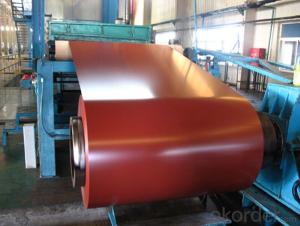Coating Guarantee PE PVDF Aluminum Coated Sheet
- Loading Port:
- Shanghai
- Payment Terms:
- TT OR LC
- Min Order Qty:
- 5 m.t.
- Supply Capability:
- 10000 m.t./month
OKorder Service Pledge
OKorder Financial Service
You Might Also Like
Item specifice
1. Specification of Coating Guarantee PE PVDF Aluminum Coated Sheet
characteristics | Application |
1) Super peeling strength | 1) Building exterior curtain walls |
2) Excellent surface flatness and smoothness | 2) Decoration and renovation additions for old buildings |
3) Superior weather, corrosion, pollutant resistance | 3) Decoration of interior walls, ceilings, bathrooms, kitchens and balconies |
4) Even coating, various colors | 4) Shop door decorations |
5) Fireproof, excellent heat and sound insulation | 5) Advertisement board display platforms and signboards |
6) Superior impact resistance | 6) Wallboards and ceilings for tunnels |
7) Lightweight and easy to process | 7) Industrial materials, materials for vehicles and boats |
2. Application of Coating Guarantee PE PVDF Aluminum Coated Sheet
(1).Interior: wall cladding, ceilings, bathrooms, kitchens and balconies, shutters, doors...
(2).Exterior: wall cladding, facades, roofing, canopies, tunnels,column covers , renovations...
(3).Advertisement: display platforms, signboards, fascia, shop fronts...
3. Feature of Coating Guarantee PE PVDF Aluminum Coated Sheet
*Such coil is specially designed to replace aluminum ingot, due to the high export tax of aluminum ingot, the coil has better price than ingot.
*This type of coil can fit customer's remelting furnace just like ingot, no need to make any change to the production line that was previously used for ingot. The standard coil size and weight is very suitable for the feed gate of furnace.
*This type of coil causes less material wastage than ingot when remelted.
*Our coil is made directly from ore, no need to go though the ingot making process, quality is much better than other suppliers who use ingot scrap to make coil.
Be free from Oil Stain, Dent, Inclusion, Scratches, Stain, Oxide Dicoloration, Breaks, Corrosion, Roll Marks, Dirt Streaks and other defect which will interfere with use
4. Certificate:
SGS and ROHS(if client request, paid by client), MTC(plant provided), Certificate of Origin(FORM A, FORM E, CO), Bureau Veritas and SGS (if client request, paid by client), CIQS certificate
5. Image of Coating Guarantee PE PVDF Aluminum Coated Sheet
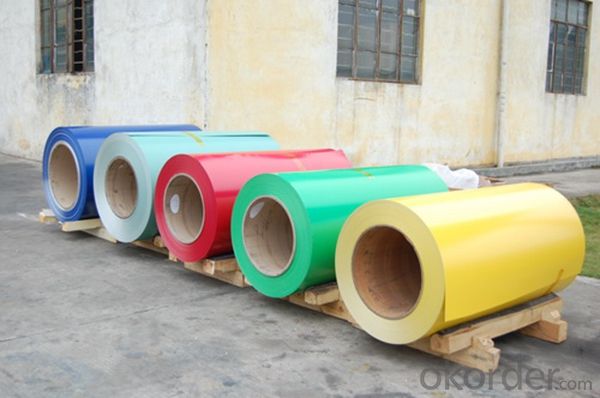
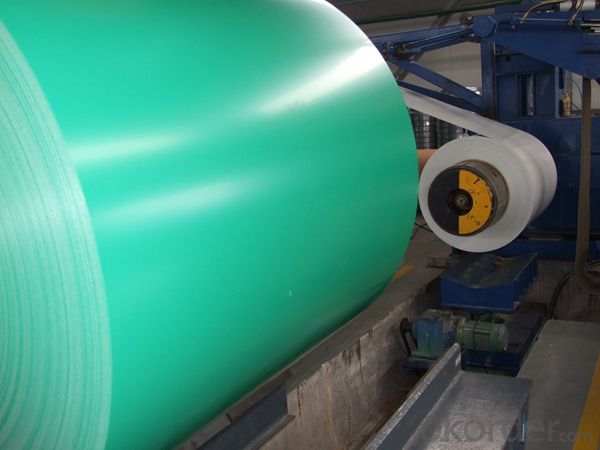
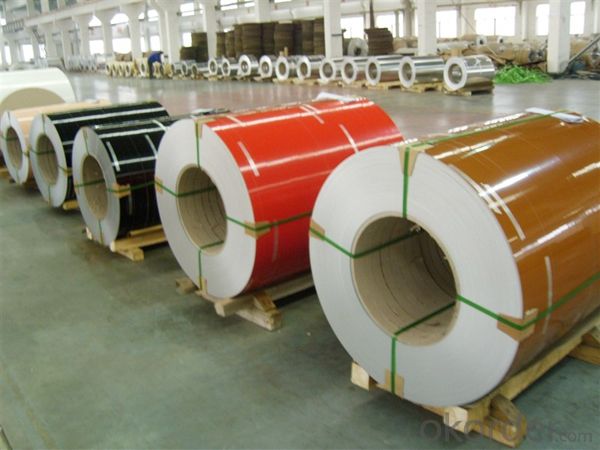
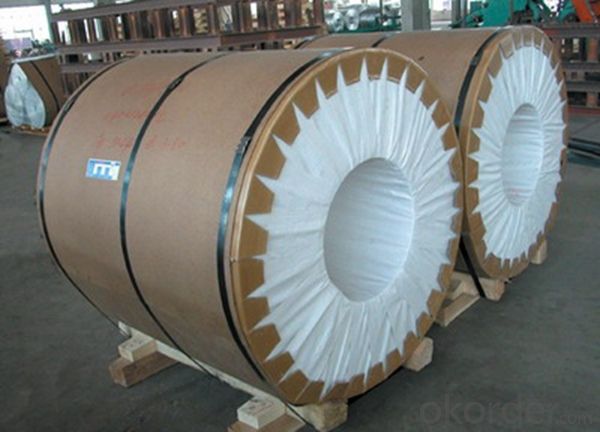
6. Package and shipping of Coating Guarantee PE PVDF Aluminum Coated Sheet
eye to wall
eye to the wall
with wood pallet (wooded case also available)
7. FAQ
1) What is the delivery time?
Dpends on actual order, around 20 to 35 days
2)What is the QC system:
We have QC staff of 20 persons and advanced equipment, each production is with MTC traced from Aluminum ingot lot.
3) What market do you mainly sell to?
Australia, America, Asia, Middle East, Western Europe, Africa etc
- Q:Aluminum roll 220 kg.0.3 thickness, 500 width, roll diameter is how much?
- You can use the outside diameter, the inner diameter and the width to get the volume. You know the density and volume, and then you can find the weight naturally
- Q:How do aluminum coils compare to other metal coils like steel or copper?
- When comparing aluminum coils to steel or copper coils, there are several advantages and disadvantages to consider. In terms of weight, aluminum coils are significantly lighter than steel coils. This makes them easier to handle and transport, resulting in potential cost savings for the manufacturing and construction industries. On the other hand, steel coils offer superior strength and durability, making them more suitable for heavy-duty applications where strength is crucial. When it comes to corrosion resistance, aluminum coils have a natural oxide layer that protects them from rust and corrosion. This makes them an excellent choice for outdoor applications or environments with high humidity. While copper coils also have excellent corrosion resistance, steel coils are more susceptible to rust and require additional protective coatings. Thermal conductivity is another important factor to consider. Copper is well-known for its exceptional thermal conductivity, making it highly efficient for applications that require heat transfer, such as HVAC systems. Although aluminum coils have lower thermal conductivity than copper, they are still widely used in various heat transfer applications due to their lightweight nature and cost-effectiveness. Cost is a significant consideration when comparing different metal coils. Generally, aluminum coils are more affordable than copper and steel coils, making them a popular choice in many industries. However, for heavy-duty applications, steel coils often provide the most cost-effective option due to their superior strength and durability. Ultimately, the choice between aluminum, steel, or copper coils depends on the specific requirements of the application. Each metal possesses its own unique properties and advantages, and selecting the appropriate material involves considering factors such as weight, strength, corrosion resistance, thermal conductivity, and cost.
- Q:Are there any limitations to the minimum coil width of aluminum coils?
- Limitations exist for the minimum coil width of aluminum coils due to various factors, such as the manufacturing process and equipment used. Generally, the coil width is restricted by the capabilities of the rolling mill or other processing machinery. The minimum coil width is typically determined by the size of the rolls or mandrels utilized during production. If the coil width becomes too narrow, it can lead to stability and integrity issues, making handling and transportation more challenging. Furthermore, a narrower coil width may impact the overall efficiency of the manufacturing process. Hence, it is crucial to take these limitations into account when establishing the minimum coil width for aluminum coils.
- Q:Are aluminum coils suitable for aerospace applications?
- Yes, aluminum coils are suitable for aerospace applications. Aluminum is known for its lightweight yet strong properties, making it an ideal material for aerospace components. It offers excellent corrosion resistance, high thermal conductivity, and good electrical conductivity, all of which are crucial in aerospace engineering. Additionally, aluminum coils can be easily formed and fabricated, making them versatile for various aerospace applications, such as structural components, aircraft frames, and heat exchangers.
- Q:is there an anti-perspirant without aluminum in it for men? i saw there was a female question for it but i need a male one xD. something that you can find at your local wal-mart or such.
- addidas makes one ( only one of there kinds is aluminum free, you have to look at the labels carefully) ... it smells clean, man or women can use it. There is a brand called JASON as well that is all natural... thoes are the only 2 worth a darn. Ive tried others but they suck. Addidas is probably stronger if that is your concern. I have both in my bathroom right now, my husband and i both use them.
- Q:What are the potential applications of painted aluminum coils?
- Painted aluminum coils have a wide range of potential applications due to their durability, versatility, and aesthetic appeal. One of the most common applications is in the construction industry, where painted aluminum coils are used for roofing and siding materials. The painted coating enhances the longevity of the aluminum by providing protection against corrosion, UV rays, and harsh weather conditions. Additionally, painted aluminum coils find applications in the manufacturing of transportation vehicles. The lightweight nature of aluminum makes it an ideal material for automotive parts, such as body panels and trim. The painted coating not only enhances the appearance of the vehicle but also provides a protective layer against scratches and dents. Another potential application of painted aluminum coils is in the production of household appliances. The painted coating adds a distinct finish to appliances like refrigerators, ovens, and washing machines, making them more visually appealing. Moreover, the protective layer helps to prevent damage from everyday use, increasing the lifespan of the appliances. Furthermore, painted aluminum coils find use in the signage industry. The ability to apply vibrant colors and designs on the coils makes them suitable for creating eye-catching signs and billboards. The durability of the painted coating ensures that the signage remains vibrant and intact even in outdoor environments. In the furniture industry, painted aluminum coils can be used for manufacturing various pieces such as chairs, tables, and cabinets. The lightweight nature of aluminum makes the furniture easy to move and transport, while the painted coating adds a stylish and modern touch to the designs. Overall, the potential applications of painted aluminum coils are vast and diverse, ranging from construction and automotive to appliances, signage, and furniture. The combination of durability, versatility, and aesthetic appeal makes painted aluminum coils a popular choice in various industries.
- Q:How do aluminum coils contribute to energy-efficient appliance manufacturing?
- Due to their unique properties and benefits, aluminum coils play a vital role in the manufacturing of energy-efficient appliances. The lightweight nature of aluminum allows for reduced overall weight in appliances, making transportation and installation easier. This leads to decreased energy consumption during transportation and less strain on the appliance. Additionally, aluminum possesses excellent thermal conductivity properties, which are essential in designing energy-efficient appliances. When used in coils, aluminum enables efficient and rapid heat transfer, resulting in more effective cooling or heating while consuming less energy. This improved thermal efficiency not only reduces energy consumption but also enhances the overall performance and lifespan of the appliance. Furthermore, aluminum coils are highly resistant to corrosion, making them ideal for appliances exposed to moisture or humid environments. By utilizing aluminum coils, manufacturers ensure durability and longevity, reducing the need for frequent repairs or replacements. This durability minimizes energy waste associated with manufacturing and disposing of appliances. Moreover, aluminum is a highly recyclable material that can be recycled infinitely without losing its properties. By incorporating aluminum coils into appliance manufacturing, manufacturers promote sustainability and reduce their carbon footprint. The use of recycled aluminum also requires significantly less energy compared to producing new aluminum, further contributing to energy efficiency. In conclusion, the lightweight nature, excellent thermal conductivity, corrosion resistance, recyclability, and overall durability of aluminum coils contribute to energy-efficient appliance manufacturing. By leveraging these advantages, manufacturers can create appliances that are not only more energy-efficient but also more sustainable and long-lasting, benefiting both consumers and the environment.
- Q:What is the fatigue strength of aluminum coils?
- Various factors, including the specific alloy used, the manufacturing process, and the application, can cause the fatigue strength of aluminum coils to vary. In comparison to other materials, aluminum alloys generally possess good fatigue strength, making them appropriate for a broad range of applications that necessitate resistance to cyclic loading and fatigue. Due to their lightweight nature and excellent corrosion resistance, aluminum coils find common use in industries such as automotive, aerospace, and electrical. Fatigue testing is typically employed to determine their fatigue strength, involving subjecting the material to repeated cycles of stress until failure occurs. Aluminum alloys in coil form are engineered to endure cyclic loading without experiencing significant damage or failure. The fatigue strength of aluminum coils can be influenced by factors like alloy composition, heat treatment, and surface finish. Generally, higher strength aluminum alloys, such as those belonging to the 7000 series, exhibit greater fatigue strength compared to lower strength alloys like the 1000 or 3000 series. To accurately ascertain the specific fatigue strength of aluminum coils, it is vital to consider the intended application, expected stress levels during operation, and desired service life. Predictions regarding fatigue life can be made using various models and testing methods, such as S-N curves (stress amplitude vs. number of cycles to failure). In summary, aluminum coils generally possess good fatigue strength, rendering them a suitable choice for applications requiring resistance to cyclic loading and fatigue. However, the specific fatigue strength of aluminum coils can vary depending on factors such as alloy composition, heat treatment, and surface finish. To accurately determine the fatigue strength for a specific application, it is advisable to consult technical specifications or conduct fatigue testing.
- Q:What are the different mechanical properties of aluminum coils?
- Aluminum coils possess various mechanical properties that make them highly desirable for a wide range of applications. Some of the key mechanical properties of aluminum coils include: 1. Strength: Aluminum coils exhibit impressive strength, making them suitable for structural applications. The strength of aluminum can be further enhanced through alloying or heat treatment processes. 2. Ductility: Aluminum coils are highly ductile, allowing for easy forming and shaping. This property enables the production of complex shapes and intricate designs without compromising the material's integrity. 3. Lightweight: Aluminum is renowned for its low density, making it one of the lightest metals available. This property makes aluminum coils ideal for applications where weight reduction is crucial, such as in aerospace and automotive industries. 4. Corrosion resistance: Aluminum has natural corrosion resistance, forming a protective oxide layer that prevents further oxidation. This property makes aluminum coils suitable for outdoor and marine environments, as they can withstand harsh conditions and reduce maintenance requirements. 5. Conductivity: Aluminum is an excellent conductor of both heat and electricity. This property makes aluminum coils ideal for applications that require efficient heat transfer, such as in heat exchangers and electrical wiring. 6. Machinability: Aluminum coils are relatively easy to machine due to their low melting point and excellent chip formation. This property allows for high-speed machining operations, resulting in reduced production time and costs. 7. Weldability: Aluminum coils can be easily welded using various techniques, such as TIG (Tungsten Inert Gas) or MIG (Metal Inert Gas) welding. This property enables the fabrication of complex structures and the joining of aluminum components. 8. Fatigue resistance: Aluminum exhibits excellent fatigue resistance, allowing it to withstand repeated stress cycles without failure. This property makes aluminum coils suitable for applications subjected to cyclic loading, such as in automotive components or structures exposed to wind or waves. Overall, the unique combination of mechanical properties possessed by aluminum coils, including strength, ductility, lightweight, corrosion resistance, conductivity, machinability, weldability, and fatigue resistance, makes them a versatile material choice for a wide range of industries and applications.
- Q:Can aluminum coils be used in the production of aluminum composite windows?
- Yes, aluminum coils can be used in the production of aluminum composite windows. Aluminum coils are commonly used in the manufacturing process of aluminum composite windows. These coils are made from high-quality aluminum and are often used as the raw material that is then formed and shaped into the desired window frames and components. Aluminum coils offer several advantages in the production of aluminum composite windows, including their lightweight nature, durability, and resistance to corrosion. These qualities make aluminum coils a suitable choice for manufacturers looking to produce high-quality and long-lasting aluminum composite windows.
1. Manufacturer Overview |
|
|---|---|
| Location | |
| Year Established | |
| Annual Output Value | |
| Main Markets | |
| Company Certifications | |
2. Manufacturer Certificates |
|
|---|---|
| a) Certification Name | |
| Range | |
| Reference | |
| Validity Period | |
3. Manufacturer Capability |
|
|---|---|
| a)Trade Capacity | |
| Nearest Port | |
| Export Percentage | |
| No.of Employees in Trade Department | |
| Language Spoken: | |
| b)Factory Information | |
| Factory Size: | |
| No. of Production Lines | |
| Contract Manufacturing | |
| Product Price Range | |
Send your message to us
Coating Guarantee PE PVDF Aluminum Coated Sheet
- Loading Port:
- Shanghai
- Payment Terms:
- TT OR LC
- Min Order Qty:
- 5 m.t.
- Supply Capability:
- 10000 m.t./month
OKorder Service Pledge
OKorder Financial Service
Similar products
New products
Hot products
Related keywords
